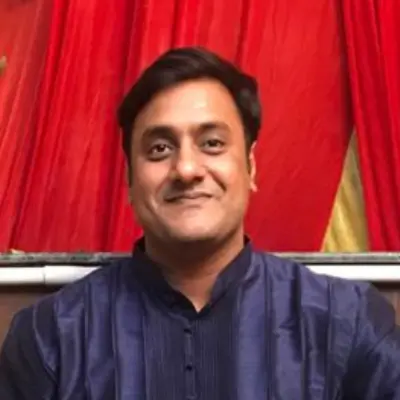
Dhaka, East Champaran District, Bihar: Repeated attempts have been made to purge nearly 80,000 Muslim voters from Bihar’s Dhaka constituency electoral roll by wrongfully claiming that all of them are not Indian citizens, an investigation by The Reporters’ Collective has found.
To get these Muslim voters deleted, formal written submissions were made to the Election Commission of India’s (ECI) district officer (Electoral Registration Officer or ERO) and to the Chief Electoral Officer (CEO) of Bihar.
One submission was made in the name of the personal assistant of the Bharatiya Janata Party (BJP)’s MLA from Dhaka, Pawan Kumar Jaiswal. The other was made on the letterhead of the BJP’s state headquarters in Patna, documents reviewed by us reveal.
It was a systematic and targeted attempt to single out and delete Muslim voters en masse in the Dhaka constituency, we have been able to establish. Such attempts to tamper with and manipulate voter lists by providing false information are a crime. But the ECI officials did not take any action against people attempting the large-scale disenfranchisement of citizens in Dhaka.
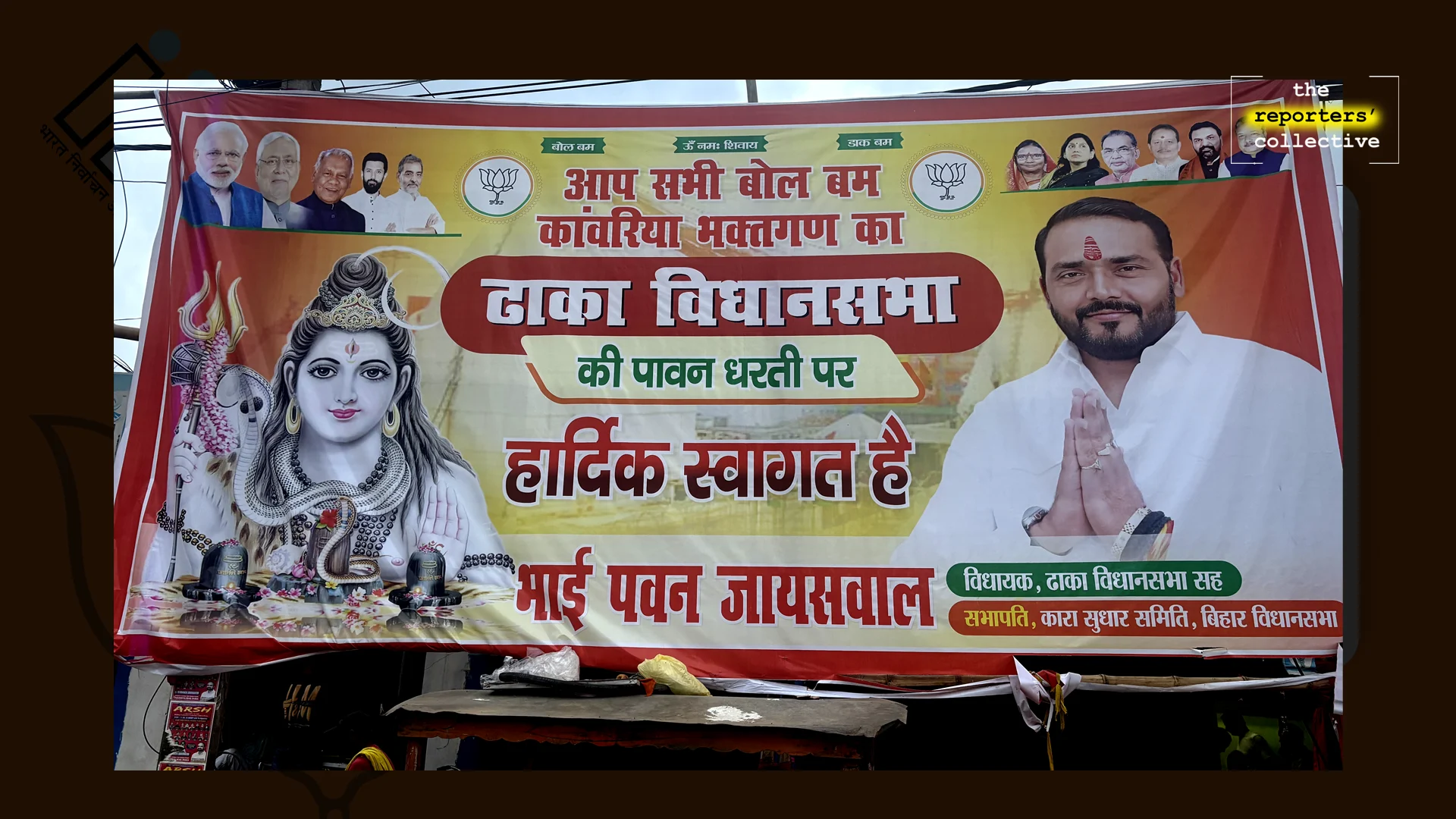
How the ECI will decide the fate of these voters will become clear only when the finalised list of voters in Dhaka is released on October 1. We found, during our reportage, that some Muslim citizens who had heard that the BJP had given their names for deletion were living in anxiety. Many, we found, were not aware of the attempt to get them declared as alien citizens.
The sitting BJP MLA, did not respond to these revelations. But, he has turned around to accuse the opposition Rashtriya Janata Dal (RJD) of seeking deletion of 40,000 Hindu voters. He, however, declined to speak or share the proof with us to back his claim despite repeated requests.
Dhaka is a border constituency in East Champaran district of Bihar, where the BJP wrested the assembly elections in 2020 from RJD by a margin of 10,114 votes against the total polled 2.08 lakh votes.
Even a few thousand wrongful deletions in the constituency could have a significant impact on the elections. The attempts were made to purge 40% of the eligible voters from the final voter list.
This is how this voter list fraud has been attempted in Dhaka constituency.
The Time for Turmoil
Between June 25 and July 24, like in the rest of Bihar, the suddenly ordered SIR took off in Dhaka. People of Dhaka got 30 days to register themselves afresh as voters, providing differing kinds of documents as proof of their citizenship, identity, and their usual place of stay.
Midway, the ECI decided that the people would have to only get their names filled on the enumeration forms, and the documentary evidence could be provided to them subsequently.
Booth-level officers (BLOs) of ECI fanned out in haste, confusion and chaos. Forms were filled by citizens and by BLOs on their behalf - a pattern that was being repeated across the state. By July 31, this phase of the SIR ended and a draft list was put out by the election commission.
Despite demands by opposition parties and civil society groups that keep a watch on electoral processes, the ECI stuck to its guns and put out the draft voter list locked in formats that made the data hard to read and analyse at scale.
When the next phase of SIR began. People who had gotten left off the draft lists, or those who found their credentials had been wrongly entered, had 30 days to check.
Booth-level officers and purported volunteers that the ECI claimed it had hired, were to now assist such aggrieved people. Under the law, any voter in the constituency, through a preset form, can also ask for the deletion of another voter on three grounds: the voter has passed away, she or he does not live in the constituency, or they are not Indian citizens.
This is to be done through Form 7. But the SIR had been launched in chaos. The norms, rules, and processes that ECI had claimed were in place often existed only on paper. On the ground, its operations were flailing.
BLOs were asked to help citizens fill out their forms for changes to the draft rolls.
Then the ECI tried to shift its onus and responsibility, and said it was also the political parties’ responsibility to detect and help correct the draft voter list. The parties have booth-level agents (BLAs) registered with the ECI to oversee and support electoral processes for their parties. Their role differs from BLOs. They are not government officials. They work for their respective parties' interests.
To depend so much on BLAs to do what was essentially the work of ECI and its staff on the ground was always going to be fraught with risk.
Delete All
The deadline to file complaints and amendments was August 31.
With thirteen days to go, starting August 19, one of the BJP’s booth-level agents (BLA) began filing complaints for the deletion of voters. Ten a day.
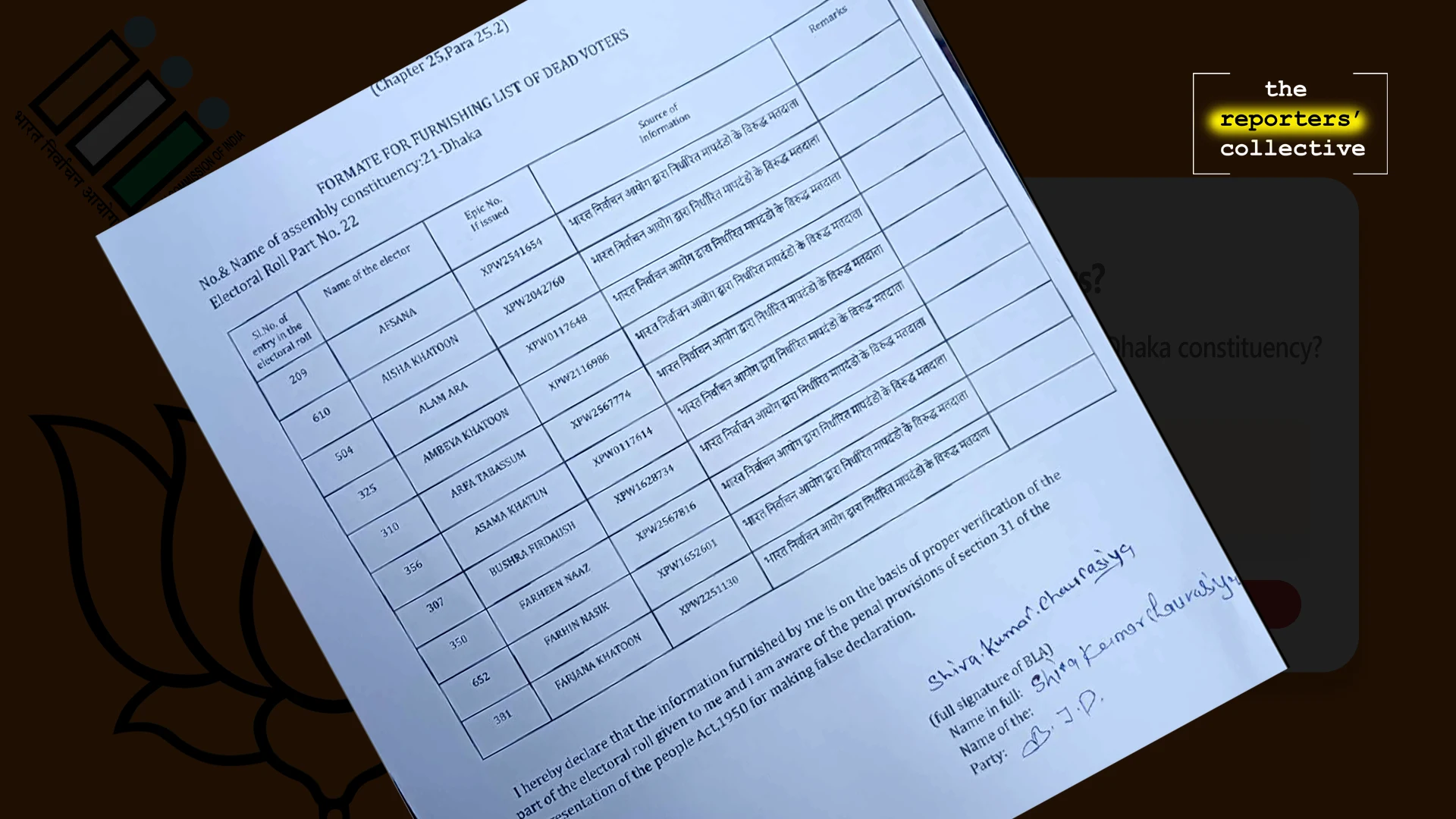
We accessed all these petitions filed by the BJP to the district Electoral Registration Officer, ECI’s official in charge of the district. All of those the BJP wanted deleted were Muslim.
Each petition was signed on behalf of the party by its BLA, stating, “I hereby declare that the information furnished by me is on the basis of proper verification of the part of the electoral roll given to me and I am aware of the penal provisions of Section 31 of Representation of People’s Act, 1950 for making false declaration.”
Section 31 of the law says that making wrongful and false claims to manipulate voter rolls is a punishable crime.
The BLA did not write down why his party wanted these names deleted. The form requires BLAs to provide reasons.
At this stage and scale, one could give the BLA and his party, the BJP, the benefit of doubt that some wrong names had entered the rolls, which they wanted removed, and that this was not a systemic and targeted attempt at purging voters from one constituency. In all, 130 names were recommended for deletion in the thirteen day period.
On the last day to submit objections to the draft voter list, another letter with annexures reached the ERO. It was signed in the name of a BJP agent at the booth level in Dhaka constituency, Dhiraj Kumar.
Dhiraj Kumar is the Dhaka BJP MLA’s personal assistant.
This submission said that people who had not existed on the voter list till January 2025 had been put on the SIR draft list without providing the various documentary proofs that the ECI mandated, including their domicile certificates.
But this time around, the submission was not for a few hundred names. It was for removing 78,384 voters from the Dhaka constituency voter list. Their names and EPIC numbers had been listed systematically in the submission.
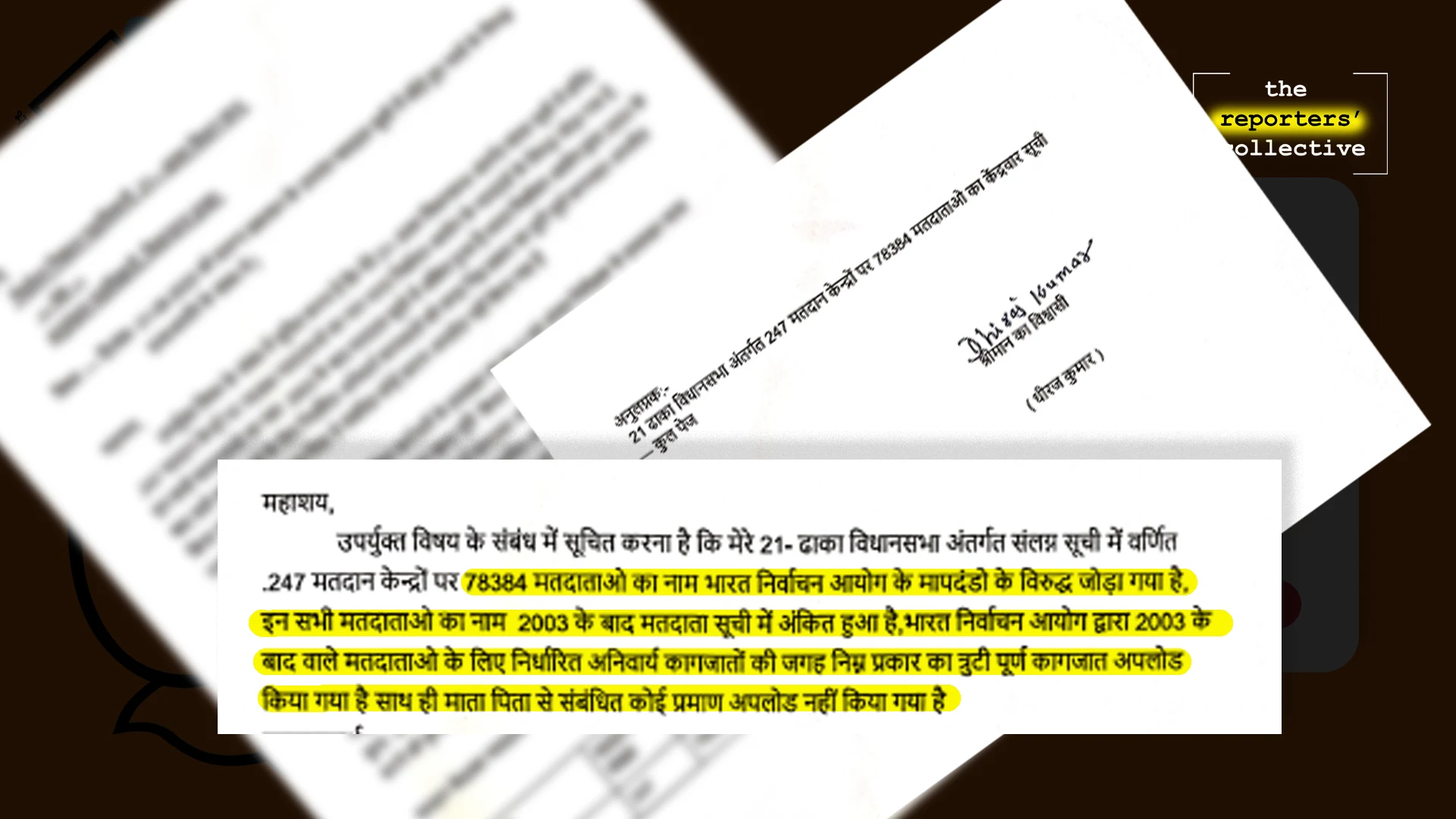
It got worse. A letter was sent on the BJP state headquarters letterhead to the Chief Electoral Officer (CEO) at Patna. The CEO is the Commission’s most senior official in a state.
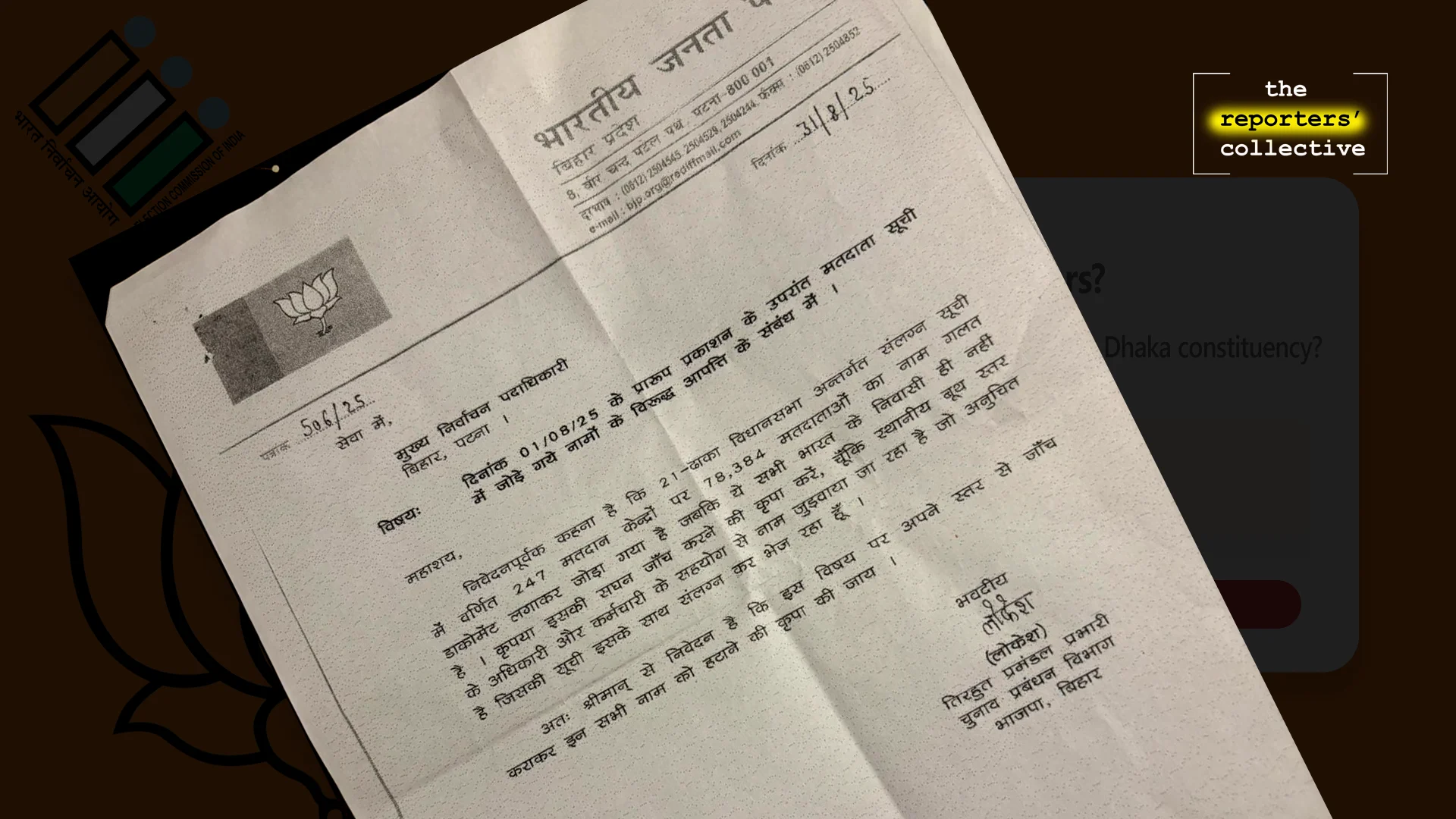
In this submission too, deletion of the 78,384 voters of Dhaka was demanded. But this time, for a different reason. The submission on BJP’s letterhead said all 78,384 of these Muslim voters are not Indian citizens.
The letter, on the party's Bihar office letterhead, was signed by a “Lokesh” as Tirhut Pramandal Prabhari, Election Management Department, Bihar. Tirhut region consists of Muzaffarpur and adjoining districts.
We spoke to Muzzafarpur’s BJP Chunao Prabhandak, Govind Srivastav, to identify the said Lokesh. He said, “There is no Lokesh working for the BJP here”
We also contacted Sunil Sahni, the BJP’s Organisational President for Dhaka. Questioning about the letter sent to CEO Bihar, where the 78,384 voters were called not residents of India written in the name of Lokesh. He said, "I represent Dhaka, Chiraiya, and Madhuban assembly constituencies, but to my knowledge, no such person exists here. As for the deletions, only those who are not citizens of the country and are trying to settle here illegally from Nepal and Bangladesh have been struck off. The citizens of the rest of the country have no problem.” He did not deny the existence of the letter, or the initial petition shared with Dhaka’s ERO by Pawan Jaiswal’s personal assistant.
BJP officials have also not filed any police complaints so far about these submissions being forgeries in the name of their party.
The digitally produced list of 78,384 voters - either Muslim or with names that would stereotypically be associated with the Muslim community suggests that computer programs had been used to filter out names of Muslim voters using identifiers. Or that a booth-by-booth exercise had been undertaken to segregate and collate names of Muslim voters.
It is quite usual that accusations fly around of booth-level officers being in cahoots with the party in power if the assembly MLA is from the party. In this case, oddly, the BJP claimed that the booth-level workers and other ECI workers had conspired to enrol these voters illegally.
We accessed the list with names and EPICs of these voters that the BJP had claimed were illegal immigrants. We confirm that almost all were Muslim voters.
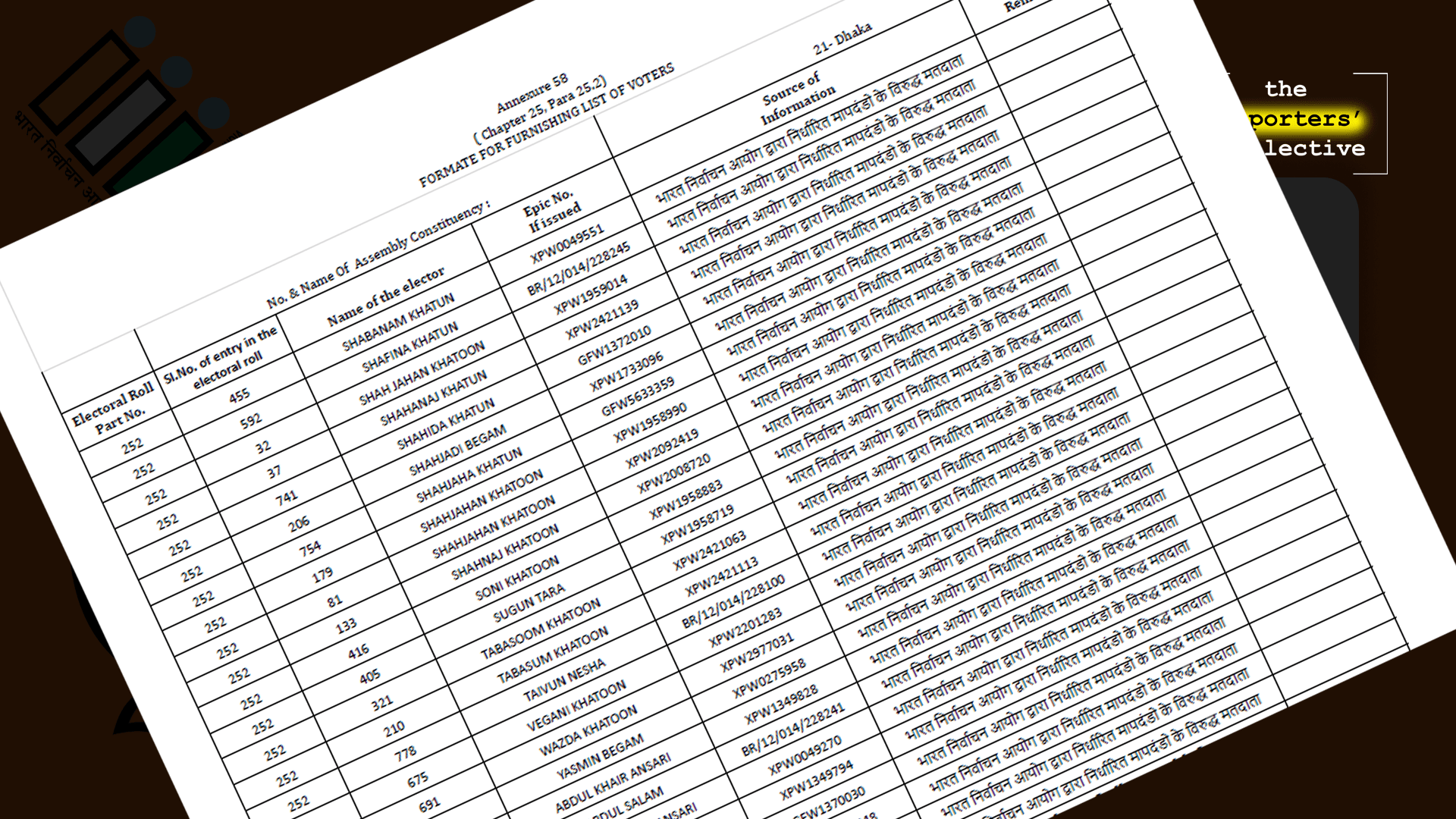
During the investigation, we asked the ERO of Dhaka how he had dealt with the demand purportedly by the BJP for deleting the Muslim constituency’s voters. He affirmed that he had received the complaint. We specifically enquired about the most egregious claim, a letter to the CEO Bihar marking 78,384 as not Indian citizens, and further orders issued to election officials in Dhaka about the claim. To this question, he replied, “Documents of these (78,000) voters would get verified during the regular verification period of the SIR.”
He said he had given receipts against the submissions and informed those asking for en masse deletions that such requests for bulk removal of voters would not be entertained. But, he refused to share proof of receipts or official communication on these submissions from his office.
We tried multiple times to speak to the BJP MLA, Pawan Jaiswal, including by visiting his office. We also spoke to Dhiraj Kumar, Pawan Jaiswal’s personal assistant, who was the first to file a petition with the ERO Dhaka to remove 78,384 voters. He did not deny sending the submission and instead said he would arrange an interview with his boss, the MLA Pawan Kumar Jaiswal on these enquiries. Despite repeated subsequent reminders, neither did he speak nor get us to speak to his boss.
Once, when we were able to independently reach Pawan Jaiswal on phone, and ask him about the list, he replied, “Why is Delhi interested in our local matters?”
We also sent an emailed questionnaire to the MLA towards the end of the investigation. We had not received a response till the time of publishing this story.
Speaking to party workers in Dhaka of all hues, we heard that the RJD had got alerted to the BJP’s moves to delete Muslim voters. We also heard that the opposition parties’ teams in Bihar have operated cautiously during the SIR process, worried about targeted voter list manipulation amidst the chaos.
We were told by some political party constituency-level workers that another list for deletion of up to 40,000 voters had been sent to the ECI officials by an individual who is not affiliated to any political party. We repeatedly tried to access this list for proposed deletions, but were unsuccessful in doing so.
The Dhaka BJP MLA had made accusations before the media that the RJD too had written to the ERO with its list of deletions. “They (RJD) complained. They wrote and complained against 40,000 voters, calling them false voters. All of them were Hindus,” Jaiswal had said, brandishing the list on his phone. We reached out to Pawan Jaiswal, asking for an interview and a copy of the complaint, but he declined to provide either.
One constituency-level worker said, with the lack of trust in ECI’s transparency, the BJP’s purported attempt to delete Muslim voters en masse had led to a tit-for-tat war. We spoke to key RJD officials in Dhaka. They did not deny or confirm this.
We sent detailed questions to the Dhaka constituency ERO, the CEO of Bihar, and the ECI after concluding the investigation in Dhaka. We had not received responses till the time of publication. The story will be updated if either of them responds.
Why ECI and its officials are not trusted
Under the prescribed procedures of ECI on paper, deletions are not done at the mere asking of political actors. When claims are received, the ERO is required to carry out a ground-verification through the BLOs at their command and then hold a quasi-judicial review to decide if the voter is legit or should be removed. A party’s BLA is allowed to recommend changes to 10 voters’ data in a day. This could be an addition, deletion, or change of details.
But the ERO holds discretionary power to take action suo moto as well. An ERO can take cognisance of a news report or even a missive by a political leader to get voter records scrutinised the way they choose.
On the ground, several officials of political parties of all hues spoke of how the electoral roll revision can be manipulated to small degrees for targeted deletion and additions. In constituencies where the winning margins are small, this can make a significant difference.
A political consultant who has worked for more than a decade with political candidates in Bihar explained, “As elections near, it is common for political parties to share a list of voters with the ERO that need to be further scrutinised. Each side usually gives a thousand to two thousand such voters. What is happening in Dhaka is unprecedented, where a party has produced a near exhaustive list of Muslim voters.”
A retired deputy CEO of Bihar and a retired election commissioner concurred that some amount of manipulation has often been attempted. The party in power in the state has an upper hand because it can command influence over EROs and booth-level officials. Some unscrupulous politicians are more amenable to such attempts than others.
“Even if an ERO is not compromised, she or he would at best reject dubious rejection demands but usually not go as far as to file an FIR. That, in practice, requires approval from Delhi,” the retired election commissioner said, wishing to remain anonymous. By “Delhi” he meant the ECI headquarters.
We could not independently verify these generic assertions.
The Scale of Manipulation in Dhaka
For the SIR in Bihar, the ECI did not follow the laid-down processes in the manual for voter roll revision. It used discretionary powers to set new rules and amend while the exercise was ongoing. Some of the changes it made to the SIR process were in reaction to the flak it faced during hearings of an ongoing case before the Supreme Court.
This created a regulatory vacuum and bred a lack of trust in the opposition party workers on the ground. It also gave a wider berth to unscrupulous elements.
With a substantive Muslim-Yadav population, Dhaka has historically been a stronghold for the Congress and later the RJD. In 2010, the BJP’s Pawan Jaiswal first won the seat, securing a pluralistic mandate, which also included the support of Muslim voters within the constituency, only to lose the seat subsequently in 2015.
Jaiswal, who won the seat back in 2020, is up for reelection by November. Standing against him is the RJD’s Faisal Rahman, who first ousted Jaiswal from the assembly seat in 2015. His father Motiur Rahman was also an MLA from Dhaka for two consecutive terms with the Congress.
In this race between these two well-matched candidates, there is another wild card. Jan Suraaj’s L B Prasad. A doctor, with a popular clinic in Dhaka’s Nagar Parishad. He is well-regarded and liked by the locals and likely to cut into Jaiswal’s Hindu vote, local political actors and observers, both, told us.
To date, many have voiced fears that the leading alliance for the BJP and Janata Dal United will use the chaos of the SIR as a guise to disenfranchise or delete several minority voters, particularly Muslims and those from the Dalit community. However, the haste with which the exercise has been undertaken, in addition to attempts to hide voter lists of those included and deleted behind digital firewalls, has left such accusations largely speculative.
However, the fact that the BJP in Dhaka wrote to the Commission asking them to vet nearly all Muslim voters in the constituency again provides the first express proof of this intent.
The Dhaka assembly constituency lies along the Indo-Nepal border. It indeed has several migrants from Nepal, who routinely cross over owing to the porous nature of this border. Several of these migrants would not possess adequate documents, or even citizenship, to vote in India. It is also true that many of these are Muslim. But Pawan Jaiswal’s complaint via Dhaka’s BJP operatives quotes an unrealistic number.
Anxiety in Dhaka’s Muslim Voters
We visited Fulwaria Gram Panchayat, Pawan Jaiswal’s village, thus a big stronghold for the BJP. Nine hundred Muslim voters had been named by the BJP as non-Indians from this village in Jaiswal’s complaint.
Living just a kilometer away from Jaiswal’s house is Firoz Alam, the village sarpanch for Fulwaria. He and his entire family had been named in the BJP’s complaint. “My family has lived in this village for several generations. I have contested in the local panchayat elections. How could I have done this if I am not a resident of India? Now, the BJP has shared my name, my wife’s name, and the name of my children, naming them as dubious voters.”
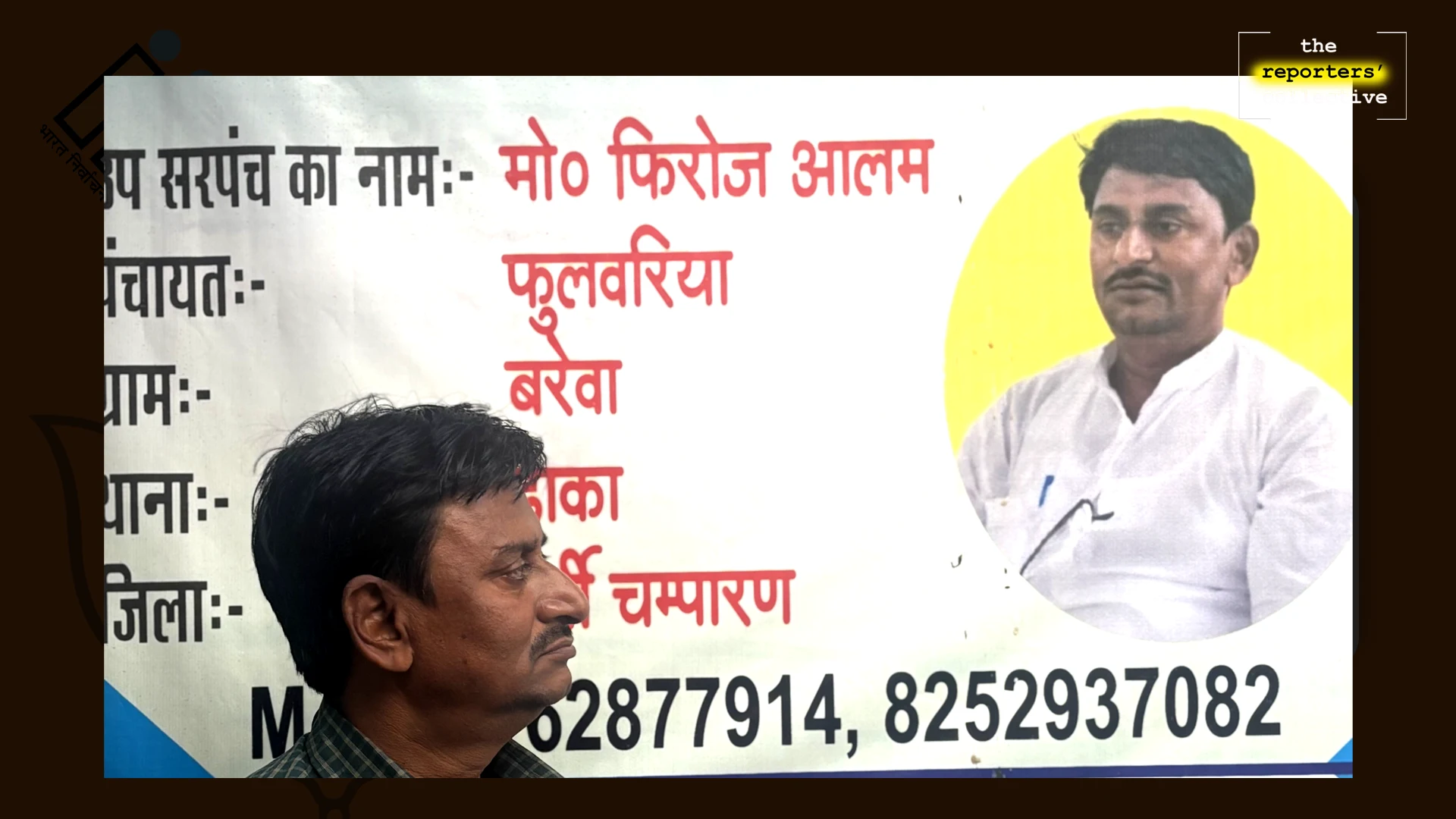
More gathered with their own stories, while we were speaking with Firoz, with their own stories to share. Schoolmaster Nasreem Akhtar interjected, “My granddaughter received her voter card just this year,” he said, brandishing her newly received voter ID still stuck to the official post, “she has been named in the list as well.”
We visited several more villages. Chandanbara, a village in Dhaka, where the majority of the population is Muslim, according to its residents. Here, over 5,000 residents had been named in the complaint. Those named included booth-level officers, school teachers, and booth-level agents.
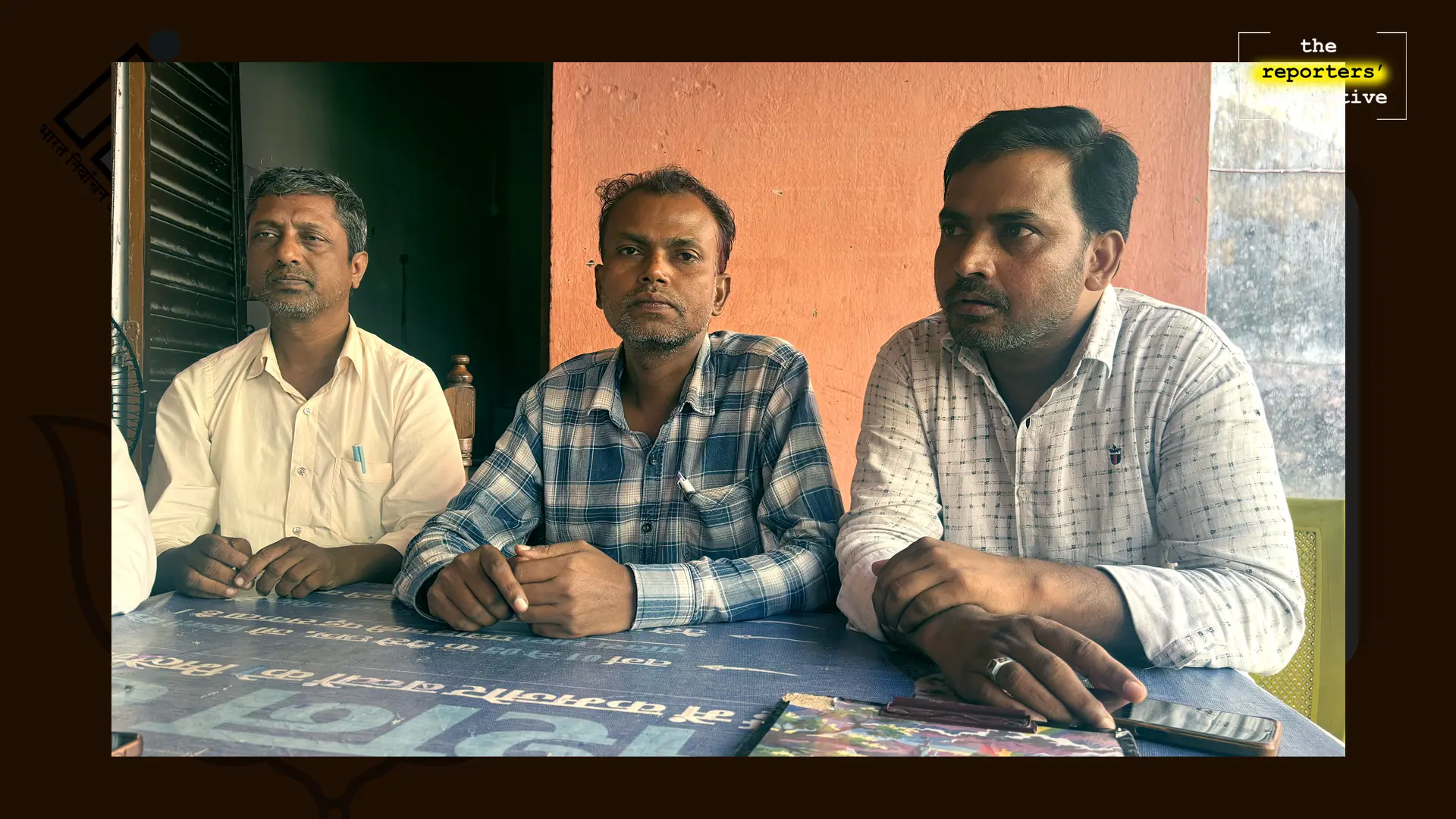
We spoke with Randhir Kumar, serving as the BLO for booth number 273 in Chandanbara. “I have received several messages from those named in the complaint, worried that their name will be removed from this list. As of now, ERO has issued no specific directions to booth-level officers on those named. So BLOs are not taking any further action.”
On October 1, the ECI will make the finalised list of Dhaka voters public. The fate of nearly 80,000 Muslim voters of Dhaka will be revealed then.


.avif)
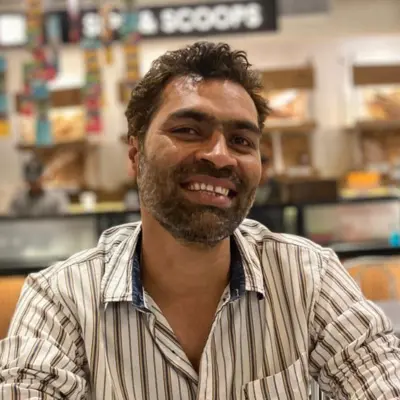
.webp)


